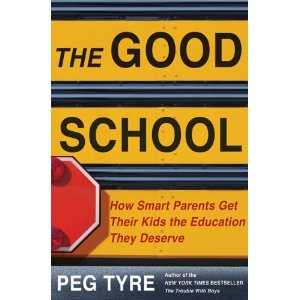The Good School: How Smart Parents Get Their Kids the Education They Deserve
Peg Tyre
By
Jesse Kornbluth
Published: Aug 16, 2011
Category:
Non Fiction
If you want your child to get into a good pre-school in my city, it’s not just a matter of forking over $15,000. First you have to get an application. And you don’t get one just by asking at any time in the fall. On the day after Labor Day — and on no other day — you have to call the schools and request applications. Many schools have only one or two phone lines; you can easily spend the entire day speed-dialing. (It’s easier for Goldman Sachs executives with multiple assistants.)
It’s not just that the New York City public schools aren’t what they might be. Or that wealthy snootballs don’t want their darling muffins playing blocks with pooty kids from the projects. Or that, as the joke goes, this is how educators who make $40,000 a year get to show people who make $40 million who’s boss. In the end, it’s about understanding that early childhood education is essential to later success in school — and in life — and acting on that understanding.
There are people on the national scene — no politics here, so no names — who think that that giving kids a head start on school is a bad idea. They should be made to read Peg Tyre’s “The Good School: How Smart Parents Get Their Kids the Education They Deserve.” [Disclosure: I have known Peg Tyre for 20 years. We have had dinner. I have never seen her living room, nor has she seen mine.] They won’t, of course, but if you have young children or have children who have young children, I hope you will — it’s a chatty, non-theoretical story of how our schools got to be testing-machines-so-the-states-get-federal-education-money and how, despite that, you can help your offspring acquire some book learning. [To buy the book from Amazon,
click here. For the Kindle download,
click here.]
As Tyre tells it, early childhood education is a recent phenomenon. In the 1830s, an influential education warned that the “mental excitement” would over-stimulate children. In l930, only .09 per cent of young children attended nursery school. As late as the 1950s, only 16 per cent left their homes for school experiences.
It’s now generally agreed that, as Tyre writes, “the central building blocks of literacy must be laid down before kindergarten.” Interestingly, that means talking to kids — and having kids talk back. A four-year-old from a family of involved, professional parents has heard 45 million words. A working class kid: 26 million words. A welfare kid: 13 million. (Thanks to handheld devices, this is changing. And not for the better. So if you’re texting away while your kid tries to tell you something certain to bore you — put the fucking thing down!!!)
What’s more important — a good teacher or a small class? Are audiobooks ok? Why are Asian kids such high-achievers? (Answer: It’s not because they’re smarter.) How much time in a school day is actually devoted to learning? Does recess matter? Why is education so much better in South Korea and Finland? “The Good School” will tell all.
Peg Tyre is a mother. (Her last book,
The Trouble With Boys, is a smart blend of research and hard-won personal knowledge.) She’s not a professional educator. She’s as much of a resource as a great librarian or that teacher you’ll never forget. Use her.


